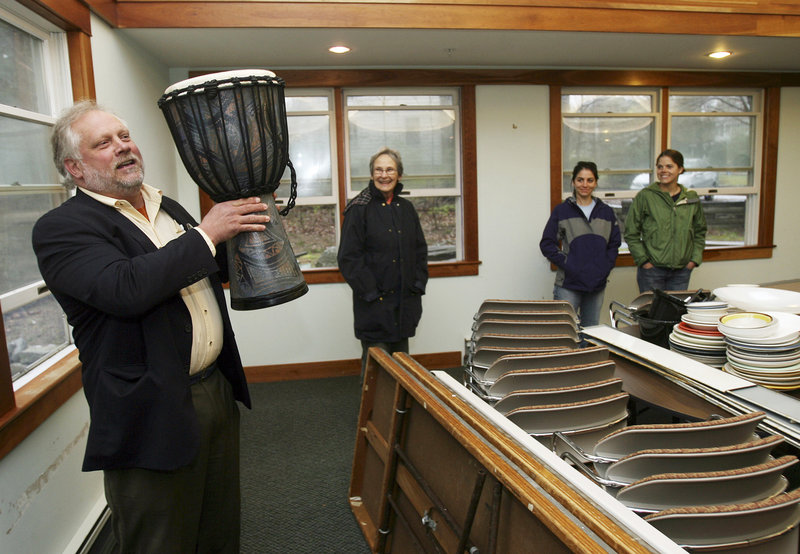DURHAM, N.H. – University of New Hampshire students who live in a campus ministry center where a young woman contracted a rare form of anthrax four months ago were allowed to return home Friday, when state officials lifted a quarantine order.
The Rev. Larry Brickner-Wood, pastor of the United Campus Ministry, unlocked the doors and led students and reporters into the room where the woman is believed to have swallowed airborne anthrax spores during a drum circle in December. Cold air blew through the open windows, dissipating the odor of chemicals used to scour the room over the last few weeks.
“This is the cleanest this room will ever be,” said Brickner-Wood, who picked up a drum and thumped it a few times.
“It’s been a tough ordeal, but not as tough as it has been for the young woman,” he said.
Authorities believe the woman, who has not been identified, swallowed naturally occurring anthrax spores propelled into the air by vigorous drumming. She began feeling sick the next day and later was hospitalized in critical condition with gastrointestinal anthrax.
She has been recovering at home the last few weeks and is doing well, said Dr. Jodie Dionne-Odom, deputy state epidemiologist. “She’s very, very lucky,” Dionne-Odom said.
Gastrointestinal anthrax has a mortality rate of 60 percent to 80 percent.
Investigating the case and reopening the center took longer than officials would have liked, but the time was necessary given the rarity of such cases, Dionne-Odom said.
Other U.S. anthrax cases traced to drums covered with animal hides have been reported but those involved spores that were either inhaled into the lungs or entered through the skin of people who were exposed while making the drums. The gastrointestinal form usually occurs after eating raw or undercooked meat.
The ministry center houses eight UNH students and a food pantry. After it was shut down, anthrax spores were found on two animal hide-covered drums, electrical outlets and other locations in the building.
Displaced students were allowed to remove a few items but had to leave most behind. Waini Wells-Bogue, a junior, spent the last four months living in a campus apartment and was eager to move back into her room at the center.
Brickner-Wood said center officials were trying to raise money to replace the furniture and other items, including computers and a piano, that had to be thrown out during the decontamination process.
The center’s insurance company has said it will not cover the $90,000 cleanup cost because “they don’t cover bacteria,” the pastor said.
Brickner-Wood said he is appealing the company’s decision.
Copy the Story Link
Send questions/comments to the editors.



Success. Please wait for the page to reload. If the page does not reload within 5 seconds, please refresh the page.
Enter your email and password to access comments.
Hi, to comment on stories you must . This profile is in addition to your subscription and website login.
Already have a commenting profile? .
Invalid username/password.
Please check your email to confirm and complete your registration.
Only subscribers are eligible to post comments. Please subscribe or login first for digital access. Here’s why.
Use the form below to reset your password. When you've submitted your account email, we will send an email with a reset code.